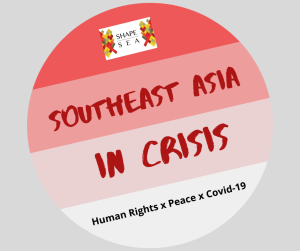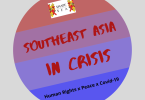Maya DaniaLecturer of International Development Program,School of Social Innovation, Mae Fah Luang University, Chiang Rai – ThailandMaya.Dan@mfu.ac.th
 The lessons that I take from Indonesia’s experience with COVID-19 is not only physical, like distancing or avoiding spread of germs, but also emotional, more on how Indonesians treat the most vulnerable among themselves. The social vulnerability comes to forefront to me as the social impacts from the pandemics have turned out to be a human tragedy.Indeed, the Indonesian experience about the virus is entirely new, terrifyingly unexplained – mysterium tremendum. However if we look at numerous cases reported on how society responds to the Coronavirus, it is obvious that perceived social raging reaction that has reached a calamity level in Indonesian society. As the COVID-19 outbreak continues to frighten the people, certain groups are facing social stigmatization and discrimination due to Coronavirus-related hate. For example, in March, numbers of healthcare staffs and medical doctors were kicked out from their residence amid community fear that the health professionals will carry the Coronavirus to their home (Jawa Pos, 2020), despite the fact that the Indonesian Medical Association expressed alarm that the number of doctors who died of Coronavirus jumped high daily and the trend of doctors dying is heading for the sky (Channel News Asia, 2020). In April, the Headman of the Village in West Sumatera was persecuted after socializing preventive actions against Coronavirus (CNN Indonesia, 2020). Also, more and more cases of community rejection to dead bodies of COVID-19 for burial around provinces in Indonesia are increasingly reported. It seems like residents are too afraid of the virus contagion regardless of President Joko “Jokowi†Widodo warning against paranoia and local government’s efforts to remind people to show compassion and practice their teachings of every religion (The Jakarta Post. 2020). The two biggest Islamic organization in Indonesia, Muhammadiyah and Nahdlatul Ulama (NU), have been also strictly asking people to permit burial for the dead bodies of COVID-19 amid the epidemic (Beritasatu, 2020).But people just don’t care. Cemeteries around neighborhoods are guarded by armed men, threatened the ambulance bringing the dead body inside to be brutally burnt or thrown by stones if it keeps trying to enter the local graveyards area. Filling with anger, fear, and anxiety, people are frightened that the dead body would contaminate the virus and eventually brings death to the neighborhoods. People are afraid to do the right thing, to give rights for others to be buried properly, while cremation is still bitterly rare (and improper for Muslims). What can be reflected from this point?I witness cultural phenomena of a society with no other value other than survival. Human emotions have evolved to their greatest survival benefit, in which disgust (and surprise) indicate a looming threat to human survival, which then initiates critical action in response to its cause to increase human chances of survival (Taylor, 2012). There is no longer even any respect for the dead in Indonesia. Wave of panic has paralyzed the country. It is visibly seen that Indonesians are prepared to sacrifice common sense, religious, and even political beliefs –just– to avoid the danger of falling ill or being contaminated. COVID-19 makes people perceive other human beings as potential contaminators to be avoided at all cost. Also the dead have no right to a proper funeral and it is just more difficult for the family to find a place to bury the corpses of their loved ones. Coronavirus is eventually a test, too, of our social solidarity, empathy, and political will. What is worrying with COVID-19 is, then, not so much in the prevention, but in the aftermath of the infection. As the virus has inexorably persisted its havoc, what will COVID-19 gives as the legacies of disruption to human rights and social values in Indonesia?Finally, when the plague appeared in the country, Indonesians must realize that we are all on the same boat. All of us are equally fragile, disoriented, and vulnerable. Nevertheless, in the same time, we are all also equally important and needed to comfort the others. As the epidemic grows worse, I may well find the notion “gotong royong†(working together to achieve one aim) of Indonesian local culture far more compelling as our potential golden rules in winning the battle against COVID-19. References:Beritasatu (4 April). (2020). Masyarakat Diimbau Tidak Tolak Pemakaman Korban Corona. Retrieved from: https://www.beritasatu.com/nasional/616845-masyarakat-diimbau-tidak-tolak-pemakaman-korban-coronaChannel News Asia (6 April). (2020). Indonesia announces biggest daily rise in COVID-19 cases, 24 doctors now dead. Retrieved from: https://www.channelnewsasia.com/news/asia/indonesia-biggest-daily-rise-covid-19-coronavirus-cases-12615040CNN Indonesia (4 April). (2020). Sosialisasi Korona, Kepala Kampung Dianiaya Hingga Lebam. Retrieved from: https://www.cnnindonesia.com/nasional/20200404135220-20-490290/sosialisasi-corona-kepala-kampung-dianiaya-hingga-lebamJawa Pos (25 Maret). (2020). Dokter dan Perawat yang Menangani Korona Diusir dari Tempat Tinggalnya. Retreievd from: https://www.jawapos.com/nasional/25/03/2020/dokter-dan-perawat-yang-menangani-korona-diusir-dari-tempat-tinggalnya/Taylor, Jim. (2012). Is Our Survival Instinct Failing Us?. Retrieved from: https://www.huffpost.com/entry/is-our-survival-instinct-_b_1588157The Jakarta Post (8 April). (2020). When your dead body is rejected everywhere. Retrieved from: https://www.thejakartapost.com/academia/2020/04/08/when-your-dead-body-is-rejectedeverywhere.html?utm_medium=Social&utm_source=Facebook&fbclid=IwAR1MkVx3FpyMTJ3_LLxKzgxHzHqwmx51NbMsKVOkcpu_H3n9kpHYx2oO5M#Echobox=1586310131
The lessons that I take from Indonesia’s experience with COVID-19 is not only physical, like distancing or avoiding spread of germs, but also emotional, more on how Indonesians treat the most vulnerable among themselves. The social vulnerability comes to forefront to me as the social impacts from the pandemics have turned out to be a human tragedy.Indeed, the Indonesian experience about the virus is entirely new, terrifyingly unexplained – mysterium tremendum. However if we look at numerous cases reported on how society responds to the Coronavirus, it is obvious that perceived social raging reaction that has reached a calamity level in Indonesian society. As the COVID-19 outbreak continues to frighten the people, certain groups are facing social stigmatization and discrimination due to Coronavirus-related hate. For example, in March, numbers of healthcare staffs and medical doctors were kicked out from their residence amid community fear that the health professionals will carry the Coronavirus to their home (Jawa Pos, 2020), despite the fact that the Indonesian Medical Association expressed alarm that the number of doctors who died of Coronavirus jumped high daily and the trend of doctors dying is heading for the sky (Channel News Asia, 2020). In April, the Headman of the Village in West Sumatera was persecuted after socializing preventive actions against Coronavirus (CNN Indonesia, 2020). Also, more and more cases of community rejection to dead bodies of COVID-19 for burial around provinces in Indonesia are increasingly reported. It seems like residents are too afraid of the virus contagion regardless of President Joko “Jokowi†Widodo warning against paranoia and local government’s efforts to remind people to show compassion and practice their teachings of every religion (The Jakarta Post. 2020). The two biggest Islamic organization in Indonesia, Muhammadiyah and Nahdlatul Ulama (NU), have been also strictly asking people to permit burial for the dead bodies of COVID-19 amid the epidemic (Beritasatu, 2020).But people just don’t care. Cemeteries around neighborhoods are guarded by armed men, threatened the ambulance bringing the dead body inside to be brutally burnt or thrown by stones if it keeps trying to enter the local graveyards area. Filling with anger, fear, and anxiety, people are frightened that the dead body would contaminate the virus and eventually brings death to the neighborhoods. People are afraid to do the right thing, to give rights for others to be buried properly, while cremation is still bitterly rare (and improper for Muslims). What can be reflected from this point?I witness cultural phenomena of a society with no other value other than survival. Human emotions have evolved to their greatest survival benefit, in which disgust (and surprise) indicate a looming threat to human survival, which then initiates critical action in response to its cause to increase human chances of survival (Taylor, 2012). There is no longer even any respect for the dead in Indonesia. Wave of panic has paralyzed the country. It is visibly seen that Indonesians are prepared to sacrifice common sense, religious, and even political beliefs –just– to avoid the danger of falling ill or being contaminated. COVID-19 makes people perceive other human beings as potential contaminators to be avoided at all cost. Also the dead have no right to a proper funeral and it is just more difficult for the family to find a place to bury the corpses of their loved ones. Coronavirus is eventually a test, too, of our social solidarity, empathy, and political will. What is worrying with COVID-19 is, then, not so much in the prevention, but in the aftermath of the infection. As the virus has inexorably persisted its havoc, what will COVID-19 gives as the legacies of disruption to human rights and social values in Indonesia?Finally, when the plague appeared in the country, Indonesians must realize that we are all on the same boat. All of us are equally fragile, disoriented, and vulnerable. Nevertheless, in the same time, we are all also equally important and needed to comfort the others. As the epidemic grows worse, I may well find the notion “gotong royong†(working together to achieve one aim) of Indonesian local culture far more compelling as our potential golden rules in winning the battle against COVID-19. References:Beritasatu (4 April). (2020). Masyarakat Diimbau Tidak Tolak Pemakaman Korban Corona. Retrieved from: https://www.beritasatu.com/nasional/616845-masyarakat-diimbau-tidak-tolak-pemakaman-korban-coronaChannel News Asia (6 April). (2020). Indonesia announces biggest daily rise in COVID-19 cases, 24 doctors now dead. Retrieved from: https://www.channelnewsasia.com/news/asia/indonesia-biggest-daily-rise-covid-19-coronavirus-cases-12615040CNN Indonesia (4 April). (2020). Sosialisasi Korona, Kepala Kampung Dianiaya Hingga Lebam. Retrieved from: https://www.cnnindonesia.com/nasional/20200404135220-20-490290/sosialisasi-corona-kepala-kampung-dianiaya-hingga-lebamJawa Pos (25 Maret). (2020). Dokter dan Perawat yang Menangani Korona Diusir dari Tempat Tinggalnya. Retreievd from: https://www.jawapos.com/nasional/25/03/2020/dokter-dan-perawat-yang-menangani-korona-diusir-dari-tempat-tinggalnya/Taylor, Jim. (2012). Is Our Survival Instinct Failing Us?. Retrieved from: https://www.huffpost.com/entry/is-our-survival-instinct-_b_1588157The Jakarta Post (8 April). (2020). When your dead body is rejected everywhere. Retrieved from: https://www.thejakartapost.com/academia/2020/04/08/when-your-dead-body-is-rejectedeverywhere.html?utm_medium=Social&utm_source=Facebook&fbclid=IwAR1MkVx3FpyMTJ3_LLxKzgxHzHqwmx51NbMsKVOkcpu_H3n9kpHYx2oO5M#Echobox=1586310131





